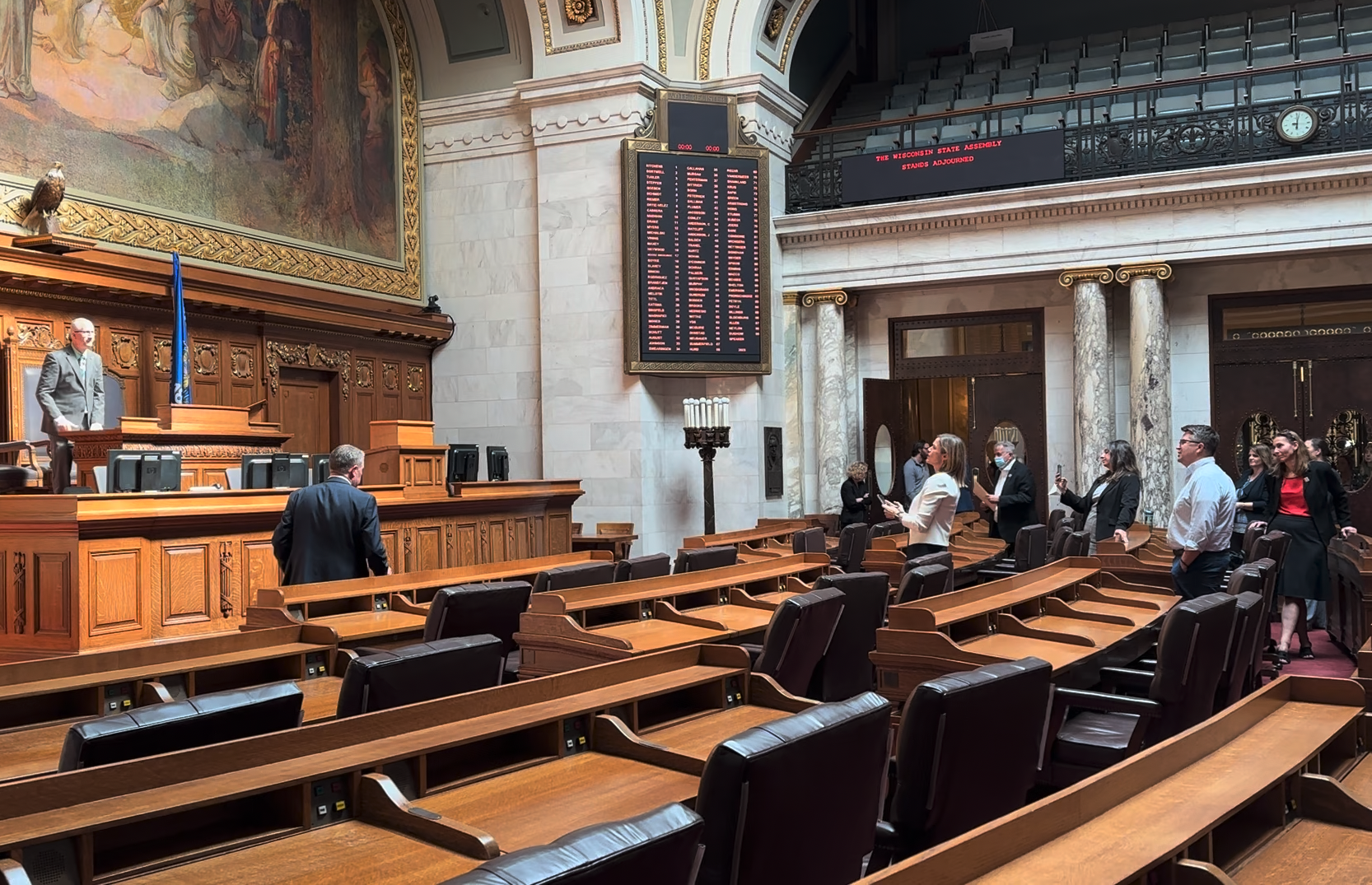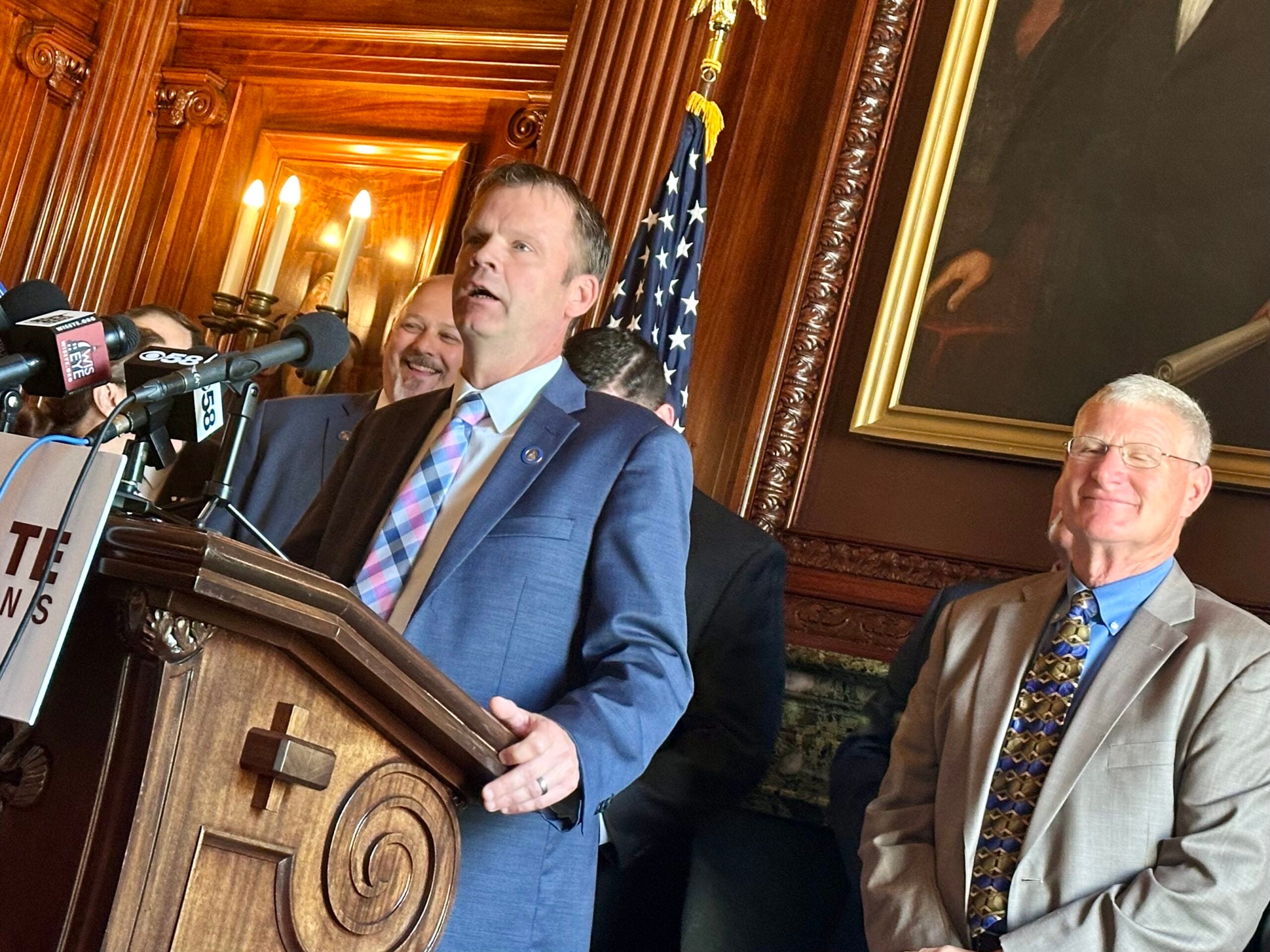A special legislative session that Democratic Gov. Tony Evers ordered to consider child care and paid leave programs wrapped up quickly Wednesday afternoon, with no action taken and the parties at odds about how to address Wisconsin’s ongoing workforce shortage and child care crisis.
In August, Evers ordered the special session to take up two bills that would reinstate programs that had been nixed from his budget proposal earlier this year. The legislation would extend a pandemic-era child care subsidy program, establish a statewide paid family and medical leave program, and pour millions of dollars into the University of Wisconsin system and other workforce development programs.
These reflect programs that Republican lawmakers cut from his biennial budget proposal earlier this year. All told, Evers is calling for using about $1 billion in surplus funds for what he describes as workforce development proposals.
News with a little more humanity
WPR’s “Wisconsin Today” newsletter keeps you connected to the state you love without feeling overwhelmed. No paywall. No agenda. No corporate filter.
Lawmakers in the state Assembly on Wednesday wrapped up the day’s business in under 40 seconds, and the state Senate also adjourned quickly.
In a statement, Senate Majority Leader Devin LeMahieu, R-Oostburg, said lawmakers in the GOP-held body would consider Evers’ bills under a “normal legislative process,” including being referred first to committee, where they will most likely languish.
LeMahieu also said that Republicans will soon unveil their own workforce proposals.
“Legislative Republicans have long supported workforce development measures that strengthen Wisconsin’s economy and create good, family-supporting jobs,” LeMahieu said.
Speaking to reporters Wednesday morning, Evers said he was “not surprised” that the session had gone nowhere.
“This group of Republicans really have not been able to wrap their arms around all sorts of things, and child care is one of them,” he said. “And if they cared about workforce, I would say they would have done exactly what I asked them to do, because there are going to be child care organizations across the state that are going to go belly up.”
Evers was referring to the Child Care Counts program, which used federal COVID-19 relief dollars to subsidize child care provider wages and keep costs stable. Democrats have called for the state to earmark $340 million annually to continue the program after the federal subsidies ended; Republicans who control the budget writing committee declined to do so.
In addition to extending Child Care Counts, Evers’ proposal called for spending about $243 million to seed a 12-week paid family and medical leave program, which would be maintained through a payroll tax.
It would also put more than $66 million toward the UW System for operating costs and to offset inflationary costs; more than $197 million to construct an engineering building at UW-Madison that is expected to increase engineering student enrollment by 1,000 students per year; and $40 million for technical colleges.
And the proposal includes $160 million for programs and grants aimed at improving the healthcare workforce.
Lawmakers not ‘shocked’ the special session went nowhere
This was not the first time Republicans have moved quickly on Evers’ special sessions, and it was clear that lawmakers on both sides expected nothing to come of the day’s business.
On Tuesday, the day before the session, Evers spokesperson Britt Cudaback sent out a statement predicting that Republicans would reject the proposals wholesale.
“Tomorrow, Republicans are set to reject Gov. Evers’ comprehensive plan to address our state’s workforce challenges,” Cudaback wrote. “Republicans are more focused on playing political games with Wisconsinites’ livelihoods, continuing their decade-long war on higher education, and making it harder to recruit and retain talented workers than finding real solutions to our state’s shrinking labor force.”
And when Evers first announced the session, Republican leaders said it would be a nonstarter.
In a statement at the time, Assembly Speaker Robin Vos, R-Rochester, said the plan would recreate Evers’ “tax and spend budget,” and said the Child Care Counts program “does nothing to address the long-term problem faced by the child care industry.”
And LeMahieu said that Republicans would focus on fixing the state’s workforce shortages by creating “a competitive tax structure that will attract talent and private investment to our state.”
On Wednesday, lawmakers in the Assembly did not bother to turn on the room’s microphones as they took a hasty vote to adjourn. The vote succeeded, after a loud “No” vote from Democrats in the room, and the day’s business wrapped in under 40 seconds.
“I’d like to say that I’m shocked, but unfortunately, I’m not,” Rep. Lee Snodgrass, D-Appleton, said afterwards. “But I do think 38 seconds is a record when we’ve had unprecedented numbers of people…reaching out and telling us that Child Care Counts needs to continue, in order for them to be able to stay open [and] for us to solve the problems that we have in child care.”
Republicans unveiled their own slate of child care proposals earlier this month. Those proposals would loosen regulations on the industry by increasing the ratio of adult staff to children and allow 16-year-olds to work as assistant child care providers. Supporters of those bills say they will open up more seats in child care facilities and help fill staffing gaps.
Republicans in the Assembly also recently passed a version of a statewide tax cut that Evers had vetoed from the final budget passed earlier this summer.
Wisconsin has faced a shrinking labor pool for years, leaving businesses across the state struggling to fill available jobs.
And even with emergency pandemic relief funds in place, Wisconsin has also faced a child care crisis for years, with a shortage of available seats as providers site low wages and parents face steep costs.
Wisconsin Public Radio, © Copyright 2025, Board of Regents of the University of Wisconsin System and Wisconsin Educational Communications Board.






